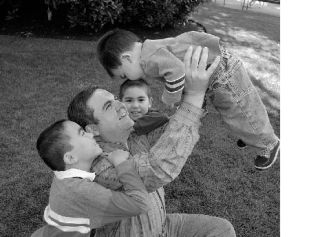March 24 is American Diabetes Alert Day. It is a one-day “wake-up” call to inform the American public about the seriousness of diabetes. Since 1997 the United States has seen a 60 percent increase in diabetes cases. Dr. Barbara Marshall, a pediatric endocrinologist with Mary Bridge Children’s Hospital and Health Center, wants to encourage parents to take an active role in monitoring their child’s risk factors and possible symptoms of diabetes. Below are some frequently asked questions and things everyone can do to help a child cope.
What is Type 1 diabetes?
Insulin is a hormone produced in the pancreas that allows the body to use carbohydrates as fuel. Type 1 diabetes is an insulin deficiency that occurs when there is destruction of the pancreatic beta cells, which are the cells responsible for producing insulin .
Who gets this type of diabetes?
Anyone can get this type of diabetes although it most commonly appears during the toddler years and again at adolescence. There is some increased risk for those with an affected family member although the risk for a sibling is only 3 to 6 percent and the risk in the offspring of a person with Type 1 diabetes is approximately 2 to 5 percent.
What is the difference between Type 1
and Type 2 diabetes?
Type 1 diabetes is caused by insulin deficiency and therefore can only be treated with insulin injections. Type 2 diabetes is caused by a relative insulin deficiency or insulin resistance. This may require insulin but can also respond to exercise and weight loss or oral medications.
What are the symptoms?
The onset of diabetes can happen gradually over months. The inability to use carbohydrates results in weight loss even though there is increased hunger and thirst. The high blood sugar levels also spill over into the urine resulting in frequent urination and sometimes bedwetting in a child who was previously potty trained.
How do you test for diabetes?
Screening for diabetes may be done with a fasting blood glucose or a glucose tolerance test that measures not only the fasting glucose but also the response to a carbohydrate.
What are the treatments for diabetes?
The only treatment for Type 1 diabetes is injected insulin. However, there are different regimens and delivery methods. Fixed dose methods require the child to follow a strict diet and are rarely used. Delivery methods range from vials and syringes to pen devices that allow you to quickly dial up your insulin dose. Insulin pump therapy allows a continuous infusion of insulin and replaces multiple injections.
What are the consequences of
uncontrolled diabetes?
Uncontrolled diabetes has long- and short-term consequences. The most serious immediate consequence of uncontrolled diabetes is diabetic ketoacidosis. This occurs when the body is forced to use protein and fat for fuel due to an insulin deficiency. The production of fuel from protein and fat produces ketones which result in acidosis. This results in a life-threatening condition. Unrecognized low blood sugars may result in hypoglycemic seizures. Long-term poor control causes microvascular and neurologic complications such as diabetic retinopathy, kidney damage, diabetic neuropathy and gastroparesis.
What can I do to help my child live a
“normal” life dealing with diabetes?
Treat the management of diabetes as “matter of fact.” Diabetes is a family disease and the whole family must be involved and support the child. Diabetes summer camps and conferences are also helpful. The series “Parenting with Love and Logic” has books that address the unique challenges of parenting a child with a chronic disease.
Developing a care plan for school
Most schools have a form to be filled out by the health care provider. If not, a form is available on the Juvenile Diabetes Research Foundation Web site. Parents should also sit down with the teachers and school nurse at the beginning of the year to discuss a care plan.
What resources are available to me
and my child?
The Juvenile Diabetes Research Foundation is a great resource for information www.jdrf.org and the local chapter sponsors events such as the diabetes “Walk To Cure Diabetes” in May.
“Children with Diabetes” is also a great Web site with information, forums, and conferences: www.childrenwithdiabetes.com.
In addition, several diabetes summer camps are available throughout the Northwest. Often it is at camp that children learn to do their first insulin injection or finger poke. Mary Bridge Children’s Hospital and Health Center also sponsors programs throughout the year for families of children with diabetes such as its annual holiday party, toddler’s carnival and “Pump It Up” education program. There is also a diabetes support group run by parents in Pierce County.
MultiCare’s Mary Bridge Children’s Hospital and Health Center in Tacoma partners with local providers and community hospitals as a regional referral center for pediatric specialty care. Mary Bridge outreach clinics are also located in Puyallup, Covington, Gig Harbor, Olympia and Silverdale serving families closer to home. For more information, visit multicare.org.
Marshall received her medical degree from Ross University School of Medicine in Dominica, West Indies. She completed her residency at Maria Fareri Children’s Hospital/New York Medical College at Westchester Medical Center, Valhalla, N.Y. Marshall then completed a fellowship in Pediatric Endocrinology at Children’s Hospital at Montefiore, Bronx, N.Y., affiliated with the Albert Einstein College of Medicine. She is board certified in pediatrics and has a special interest in treating children with diabetes and obesity.


